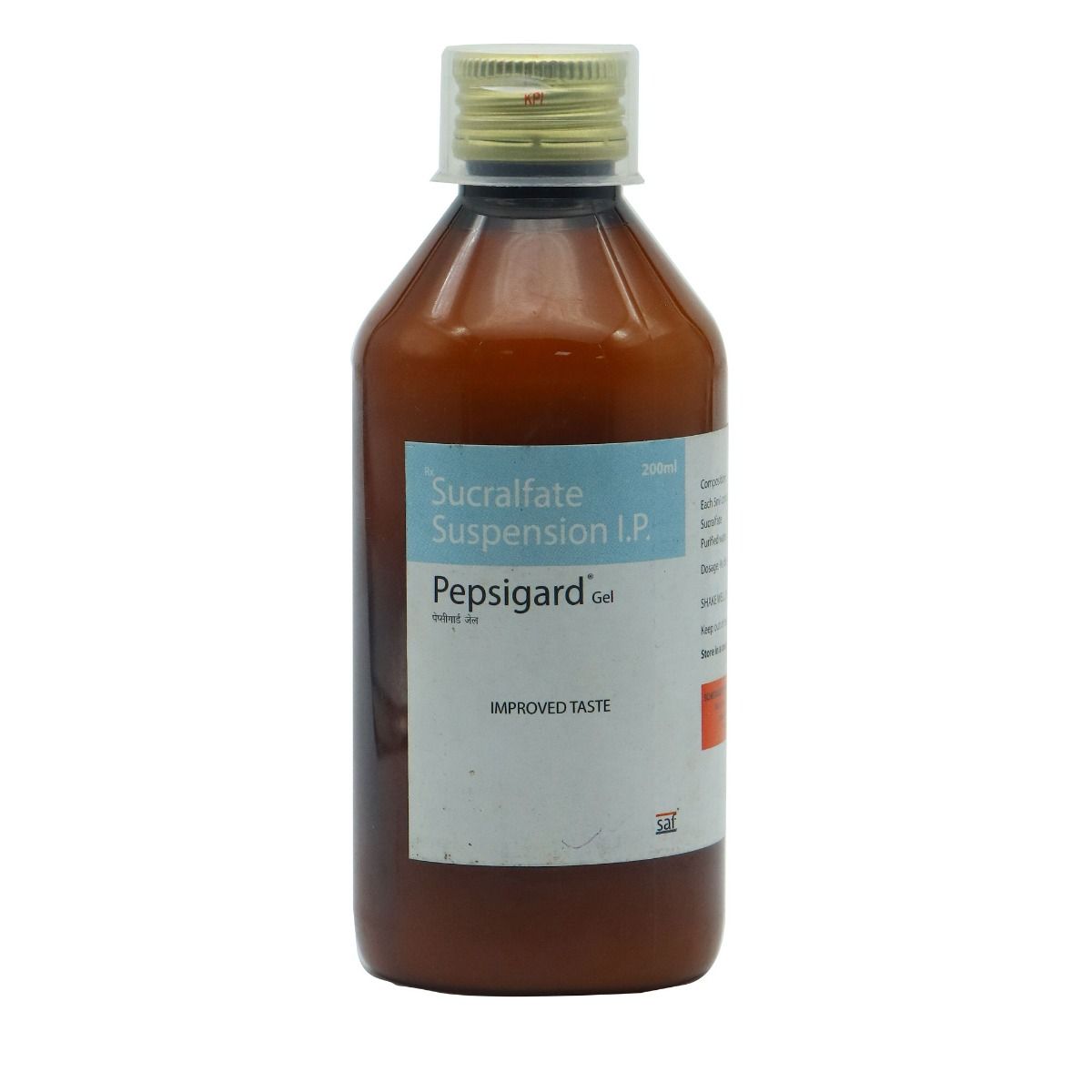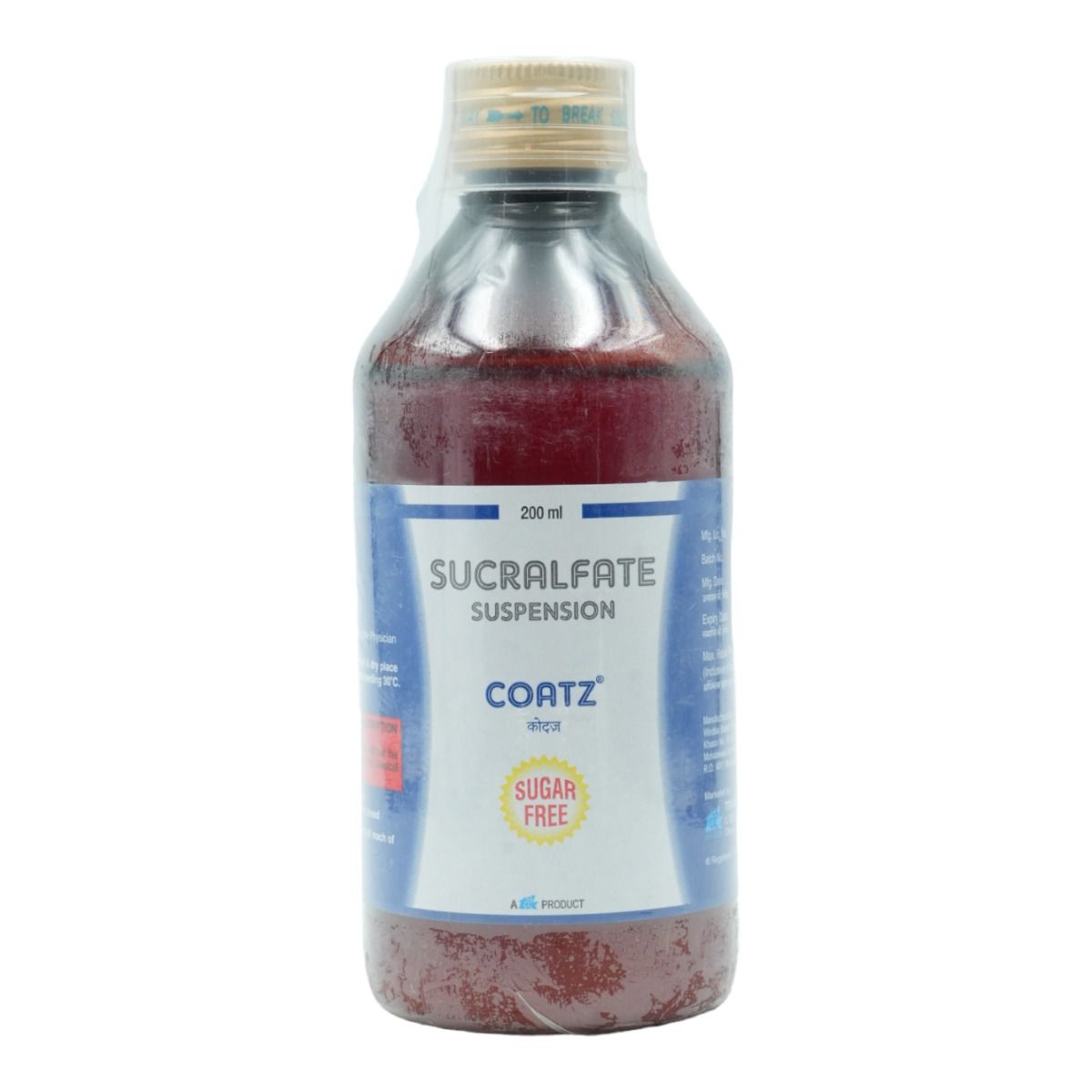Sucralfate
About Sucralfate
Sucralfate is used to prevent or treat peptic ulcers or gastrointestinal ulcers. A peptic ulcer is a sore on the stomach's lining or the first part of the small intestine (duodenum). An ulcer or sores of the stomach region is called a gastric ulcer, while an ulcer of the duodenum is known as a duodenal ulcer.
Sucralfate contains 'Sucralfate', which works by forming a protective barrier or coat over the ulcer so that digestive enzymes, acid and bile salts cannot further irritate the lining of the stomach and duodenum. This protects the ulcer from the stomach's acid, allowing it to heal.
Your doctor will advise you on how often you take Sucralfate based on your medical condition. Some people may experience common side effects like constipation, dizziness, sleepiness, dry mouth, blurred vision, and diarrhoea. Most of these side effects of Sucralfate do not require medical attention and gradually resolve over time. However, if the side effects persist or worsen, please consult your doctor.
Avoid taking any antacid like magnesium hydroxide or aluminium hydroxide within 30 minutes before or after taking Sucralfate. If you are known to be allergic to Sucralfate or active and inactive ingredients present on it, please tell your doctor. If you are pregnant or breastfeeding, it is advised to consult a doctor before using Sucralfate. Duodenal ulcer tends to be a recurrent disease. Try not to stop taking Sucralfate of your own. Stopping a sudden intake of Sucralfate will not influence the frequency or severity of future ulceration. Let your doctor know if you have any kidney problems. People with reduced kidney function may be more likely to experience side effects of aluminium accumulation with Sucralfate. The dose adjustment is necessary for patients with kidney disease and elderly patients.
Uses of Sucralfate
Medicinal Benefits
Sucralfate is a class of anti-ulcer drugs prescribed for treating or preventing the return of duodenal ulcers (ulcers located in the first part of the small intestines). Sucralfate works by forming a protective barrier or coat over the ulcer to pepsin and bile and inhibits the diffusion of gastric acid. This protects the ulcer from the stomach's acid, allowing it to heal. Sucralfate exhibits a cytoprotective effect and forms a viscous, adhesive barrier on the surface of the intact intestinal mucosa and the stomach. Sucralfate stimulates the synthesis and release of gastric mucosal prostaglandins, bicarbonate, and the epidermal growth factor, which promotes healing.
Directions for Use
Storage
Side Effects of Sucralfate
Constipation
Dizziness
Sleepiness
Dry mouth
Nausea
Drug Warnings
You should avoid taking Sucralfate if you are allergic to Sucralfate or other ingredients present in it, have kidney disease, stomach/intestine problems (delayed gastric emptying), are pregnant or planning for pregnancy, and are a breastfeeding mother. Caution is required before giving Sucralfate to elderly patients. Sucralfate contains aluminium, which is normally removed by your kidney. Therefore, older adults and people with kidney problems may be at greater risk for developing high aluminium levels while using this drug with other products containing aluminium (e.g. antacids). The safety and effectiveness in children are not established; please consult your doctor before giving Sucralfate to children.
Drug Interactions
Drug-Drug Interactions: Sucralfate interacts with the anti-HIV drug (dolutegravir), vitamin D analogues (doxercalciferol, paricalcitol), antibiotic (ciprofloxacin, gemifloxacin, levofloxacin), antidiabetic (acarbose, metformin, glipizide, glimepiride, glyburide), antacid drug (magaldrate, aluminium hydroxide) blood thinner (warfarin).
Drug-Food Interactions: Drinking alcohol and nicotine (tobacco) with Sucralfate may cause dehydration and elevate the level of stomach acid, thereby decreasing Sucralfate efficacy.
Drug-Disease Interactions: Before taking Sucralfate, inform your doctor if you have any kidney or liver disease as a dose of Sucralfate needs to be adjusted.
Drug-Drug Interactions Checker List:
Safety Advice

Alcohol
cautionDrinking alcohol with Sucralfate may cause dehydration and elevate the level of stomach acid, thereby decreasing Sucralfate efficacy.

Pregnancy
safe if prescribedSucralfate should not be taken until prescribed. Your doctor will weigh the benefits and any potential risks before prescribing it to you. Please consult your doctor.

Breast Feeding
cautionThere is limited data on how Sucralfate affects breastfeeding. Please consult your doctor, before taking Sucralfate. Your doctor will weigh the benefits and any potential risks before prescribing them to you.

Driving
cautionSucralfate decrease alertness, affect your vision or make you feel sleepy and dizzy. Do not drive if these symptoms occur.

Liver
cautionSucralfate to be taken with caution if you had or have a history of liver disease/conditions. The dose may have to be adjusted by your doctor.

Kidney
unsafeSucralfate contains aluminium, which is normally excreted by your kidney. Therefore, people with kidney problems may be at greater risk of high aluminium toxicity in the body. The dose adjustment is necessary for patients with kidney disease.

Children
cautionThe safety and effectiveness of Sucralfate in children have not been established. Please consult your doctor before giving Sucralfate to children.
Habit Forming
Diet & Lifestyle Advise
Avoid intake of acid or heartburn triggering foods or drinks like peppermint, chocolate, onions, caffeinated beverages, citrus fruits or juices, tomatoes, and high-fat and spicy foods.
Eating five or six smaller meals throughout the day rather than three large meals. It can help reduce the production of stomach acid.
Avoid taking alcohol and smoking cigarettes and red meat. It increases the production of stomach acid and makes symptoms worse. It can also cause erosion of the stomach lining.
Include the high fiber-containing foods, leafy green veggies (kale, spinach), green tea in your meal. Fermented dairy products like miso, sauerkraut, and kimchi contain probiotics which help in the prevention of excess acid production.
Cranberry juice can be beneficial in peptic ulcers and H. pylori infections.
Special Advise
Sucralfate is prescribed for acute or short-term conditions of duodenal ulcer. Do not take Sucralfate for more than eight weeks. If still, your duodenal ulcer persists, stop taking Sucralfate and contact a doctor. Sucralfate contains aluminium, so if you are a kidney patient, let your doctor know about this before taking Sucralfate.
Patients Concern
Disease/Condition Glossary
Duodenal ulcer: It is a sore that forms in the lining of the small intestine just beyond the stomach (duodenum). The stomach makes a strong acid that kills germs and helps you digest food. To protect themselves against this acid, duodenum cells make a barrier from mucus. If this barrier is damaged, an ulcer can form. The main cause of this barrier damage is infection with bacteria (H. pylori), medicines like NSAIDs or painkillers (aspirin, ibuprofen). If you have a duodenum ulcer, you might have symptoms like pain in the stomach or abdomen (this might come and go and is relieved by taking an antacid), indigestion, nauseous, feeling full after taking a small amount of food, blood or black stools.
FAQs
Sucralfate is used to prevent or treat peptic ulcers or gastrointestinal ulcers.
Sucralfate contains 'Sucralfate', which works by forming a protective barrier or coat over the ulcer so that digestive enzymes, acid and bile salts cannot further irritate the lining of the stomach and duodenum. This protects the ulcer from the stomach's acid, allowing it to heal.
Take the missed dose as soon as possible. However, if it is time for the next dose, skip the missed dose and go back to your regular dosing schedule.
Yes, Sucralfate can cause constipation. Eat a proper well-balanced diet and drink plenty of fluid to avoid it. Prefer food enriched with fibres and salads in your daily diet to cope with constipation.
Do not stop taking Sucralfate without consulting your doctor. The duodenal ulcer tends to be recurrent disease. If you stop taking Sucralfate, it will not influence the frequency or severity of future ulceration.
Do not take aspirin and ibuprofen as a pain killer while you are taking Sucralfate unless your doctor says it to take. These pain killers increase the secretion of stomach acid and exaggerate gastrointestinal bleeding. Besides this, avoid acid-containing food/drinks, coffee, tea, carbonated drinks and vegetables like lemon, tomato etc.
Available Medicines for
Sucralfate

Sucralpro Sugar free 500 mg Juicy Pineapple Flavour Suspension 150 ml
1 Bottle
₹153 (MRP 170)10%Off
cashback: 0







